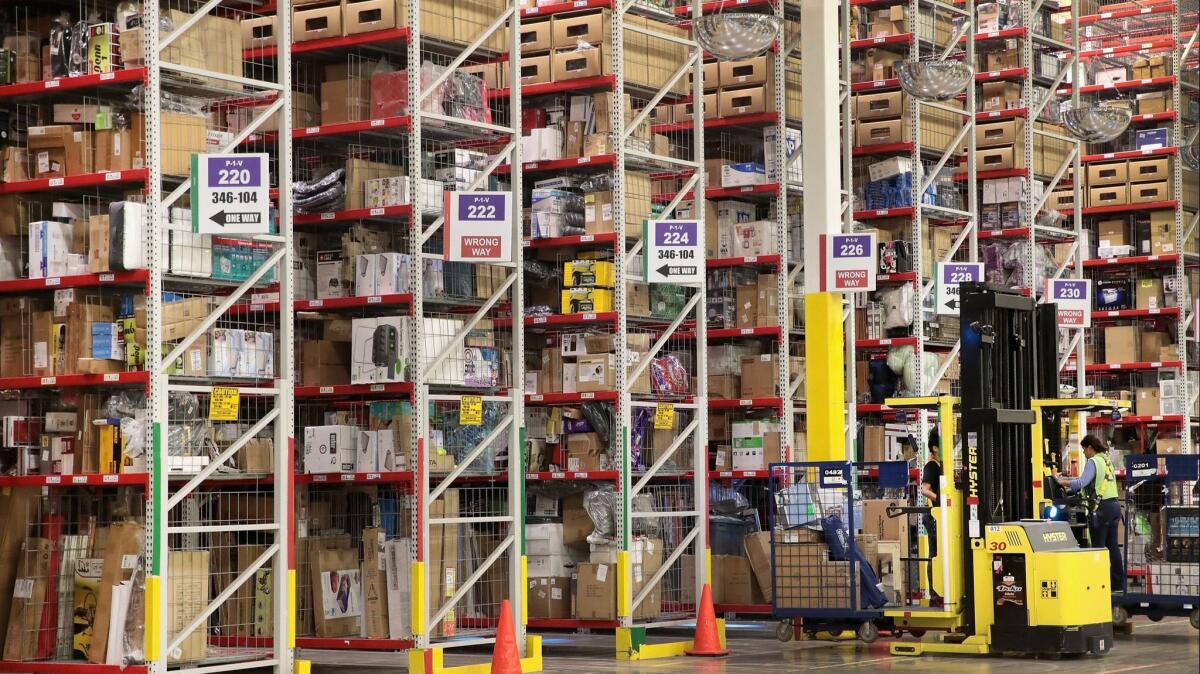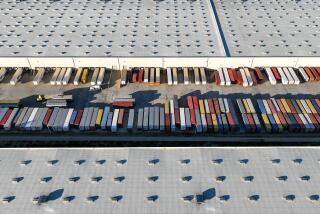Blackstone bets big on Amazon, e-commerce with $18.7-billion acquisition

The mall is now a warehouse, and Blackstone Group is betting $18.7 billion on the shift.
That’s how much the New York investment manager is paying for 179 million square feet of urban logistics properties — the warehouses used by Amazon.com Inc. and other retailers to fulfill orders from online shoppers. The deal with Singapore’s GLP, the second-largest owner of U.S. logistics real estate, will almost double Blackstone’s U.S. industrial footprint.
The rise of Amazon and other e-commerce companies has increased the need for warehouse space by retailers seeking to expand their digital operations and cut delivery times. That shift toward online shopping is also shaping the fortunes of industrial landlords, with demand especially high in large metropolitan areas where e-commerce has taken off fastest.
“This type of transaction may further validate what the public markets seem to have been saying for quite some time: Well-placed industrial real estate assets continue to be sought after by institutional capital,” said J.T. Deignan, head of real estate equity capital markets at Mizuho Securities USA.
The properties being acquired by two Blackstone investment vehicles total about 1,300 and are in high-growth markets such as greater Los Angeles, San Francisco, Seattle, Miami, New Jersey and Portland, Ore., according to a person with knowledge of the deal. Others are in Dallas-Fort Worth area, Chicago, central Pennsylvania, Atlanta and south and central Florida, said a person familiar with the deal who asked not to be identified because the information isn’t public.
Amazon and Whirlpool Corp. are the biggest tenants; others include FedEx Corp., Home Depot Inc., L’Oreal, United Parcel Service Inc., Starbucks Corp. and Tesla Inc., according to the company’s website.
The acquisitions include 231 properties with a combined total of 17.7 million square feet in the Inland Empire and Orange County, according to GLP. The Inland Empire’s Riverside and San Bernardino counties make up one of the most hotly demanded industrial property markets in the country. Inland Empire vacancy remained under 4% for the last 11 quarters even though more than 60 million square feet of new space hit the market in that time, according to real estate brokerage CBRE.
The region has long been a key logistics hub for companies distributing goods arriving through the ports of Los Angeles and Long Beach but has seen an explosion in demand in recent years from e-commerce sellers such as Amazon as well as old-line retailers such as Nordstrom and Walmart that are beefing up their online sales. In the first quarter, “the market showed no signs of deceleration due to impressive demand levels,” CBRE said in a report.
The portfolio acquisition comes amid a flurry of warehouse deals. Blackstone, the world’s biggest alternative asset manager, has made both purchases and sales in the sector, including the $7.6-billion takeover of Gramercy Property Trust in October. Also last year, Blackstone acquired Canyon Industrial Portfolio’s last-mile properties for $1.8 billion, Canada’s Pure Industrial Real Estate Trust for about $2.6 billion and more than 100 warehouse assets from Harvard University’s endowment for $950 million.
Blackstone isn’t alone in making big wagers on the continued growth of e-commerce. Berkshire Hathaway Inc. has been buying Amazon shares, with Warren Buffett’s company disclosing last month that its bet on the internet giant totaled $860.6 million at the end of March.
Jennifer Bartashus, an analyst for Bloomberg Intelligence, said much of the investment in internet commerce these days focuses on the last mile — or expediting products bought via the internet to a person’s house. It’s become a key for driving revenue growth.
“Making the shopper journey easy, with transparency into order and delivery status, is critical to success,” she said. “Companies that build engaging experiences for their customers will be rewarded with loyalty and increased spending.”
Online shopping in the U.S. is climbing. Retail e-commerce sales for the first quarter totaled $137.7 billion, an increase of 3.6% from the last three months of 2018, U.S. Commerce Department data released in May showed. Total retail sales, meanwhile, were estimated at $1.34 trillion, virtually unchanged.
Blackstone, founded in 1985 by Stephen A. Schwarzman and Peter G. Peterson, has grown to become one of the dominant buyout firms alongside the likes of KKR & Co. and Carlyle Group. In April, the firm reported its assets under management crossed half a trillion dollars, to $512 billion, for the first time.
The firm is seeking $5 billion for its latest real estate debt fund, a person familiar with the matter said last month. It has also been raising a $25-billion buyout fund, which would exceed Apollo Global Management’s $24.7 billion fund for the industry record.
Blackstone triumphed in an auction for GLP’s assets that drew bids from Prologis Inc. and Brookfield Asset Management Inc., according to a person with knowledge of the matter. Melissa Sachs, a spokeswoman for Prologis, declined to comment. A representative for Brookfield didn’t immediately respond to a request for comment.
“Logistics is our highest conviction global investment theme today, and we look forward to building on our existing portfolio to meet the growing e-commerce demand,” Ken Caplan, the global co-head of Blackstone Real Estate, said in a statement.
Perlberg, Tan and Vercoe write for Bloomberg. Times staff writers Laurence Darmiento and Roger Vincent contributed to this report.
More to Read
Inside the business of entertainment
The Wide Shot brings you news, analysis and insights on everything from streaming wars to production — and what it all means for the future.
You may occasionally receive promotional content from the Los Angeles Times.










